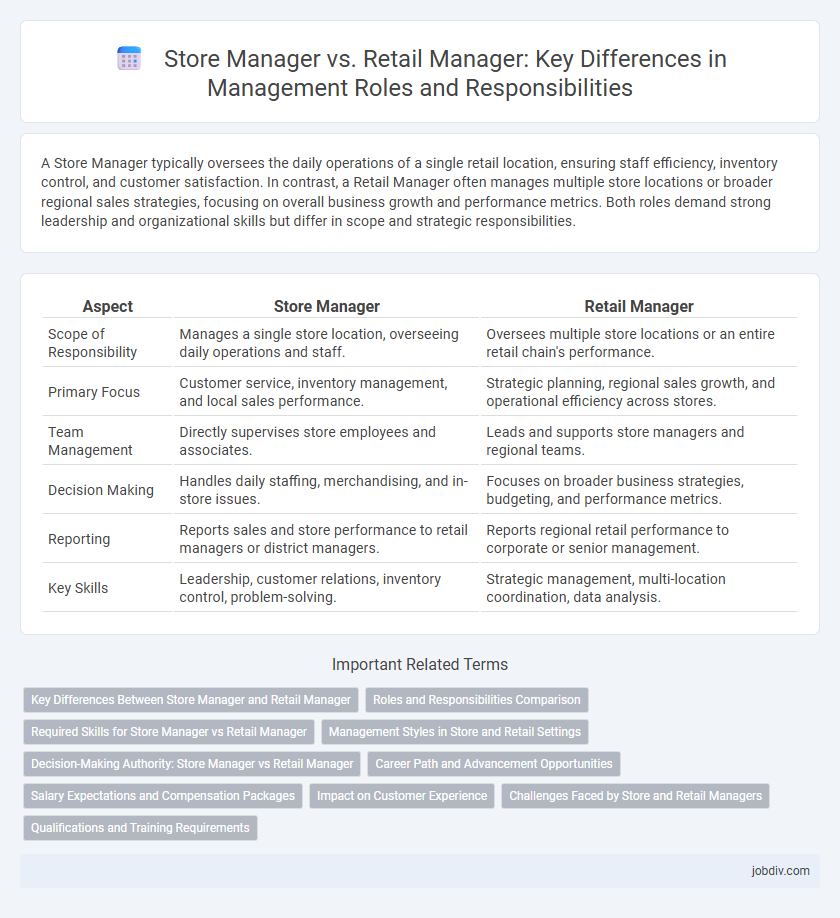A Store Manager typically oversees the daily operations of a single retail location, ensuring staff efficiency, inventory control, and customer satisfaction. In contrast, a Retail Manager often manages multiple store locations or broader regional sales strategies, focusing on overall business growth and performance metrics. Both roles demand strong leadership and organizational skills but differ in scope and strategic responsibilities.
Table of Comparison
| Aspect | Store Manager | Retail Manager |
|---|---|---|
| Scope of Responsibility | Manages a single store location, overseeing daily operations and staff. | Oversees multiple store locations or an entire retail chain's performance. |
| Primary Focus | Customer service, inventory management, and local sales performance. | Strategic planning, regional sales growth, and operational efficiency across stores. |
| Team Management | Directly supervises store employees and associates. | Leads and supports store managers and regional teams. |
| Decision Making | Handles daily staffing, merchandising, and in-store issues. | Focuses on broader business strategies, budgeting, and performance metrics. |
| Reporting | Reports sales and store performance to retail managers or district managers. | Reports regional retail performance to corporate or senior management. |
| Key Skills | Leadership, customer relations, inventory control, problem-solving. | Strategic management, multi-location coordination, data analysis. |
Key Differences Between Store Manager and Retail Manager
Store managers oversee the daily operations of a single retail location, focusing on staff management, inventory control, and customer service at the specific store level. Retail managers often have broader responsibilities across multiple stores, including strategic planning, sales performance analysis, and regional marketing initiatives. The key difference lies in scope, where store managers handle localized operational tasks while retail managers drive overall business goals across several outlets.
Roles and Responsibilities Comparison
Store managers oversee daily store operations, inventory management, and staff supervision to ensure customer satisfaction and achieve sales targets. Retail managers focus on broader regional performance, developing sales strategies, and coordinating multiple store locations to drive overall business growth. Both roles require strong leadership but differ in scope, with store managers managing individual stores and retail managers handling multi-store operations.
Required Skills for Store Manager vs Retail Manager
Store Managers require strong leadership, inventory management, and customer service skills to ensure daily store operations run smoothly and sales targets are met. Retail Managers need strategic planning, team coordination, and market analysis expertise to oversee multiple locations and develop business growth initiatives. Both roles demand excellent communication and problem-solving abilities but differ in scope and focus of management responsibilities.
Management Styles in Store and Retail Settings
Store Managers typically employ hands-on management styles, prioritizing day-to-day operational efficiency and direct staff supervision to ensure smooth in-store customer experiences. Retail Managers adopt strategic management approaches, focusing on broader business goals such as sales growth, inventory control, and team leadership across multiple locations. Effective management in store and retail settings requires balancing task-oriented and people-oriented leadership to drive performance and employee engagement.
Decision-Making Authority: Store Manager vs Retail Manager
Store Managers possess direct decision-making authority over daily operations, staffing, and customer service within a single retail location, enabling swift, location-specific responses. Retail Managers oversee multiple stores or an entire region, making strategic decisions on inventory distribution, marketing strategies, and performance targets to optimize overall retail chain success. The scope of decision-making for Retail Managers is broader and more strategic, while Store Managers exercise operational control at the store level.
Career Path and Advancement Opportunities
Store managers typically oversee the daily operations of a single retail location, making their career advancement candidates for regional or district manager roles. Retail managers often have broader responsibilities, including managing multiple store locations, overseeing merchandising, and driving sales strategies, positioning them for executive roles such as director of retail or vice president of operations. Career progression in both roles emphasizes leadership skills, operational expertise, and the ability to drive business growth, with retail managers generally having a wider scope that can lead to higher-level management opportunities.
Salary Expectations and Compensation Packages
Store Managers typically earn a median salary ranging from $45,000 to $60,000 annually, with compensation packages including bonuses tied to store performance and health benefits. Retail Managers often command higher salaries, averaging between $55,000 and $75,000 per year, reflecting broader responsibilities such as overseeing multiple store locations or regional operations. Bonus structures, stock options, and comprehensive benefits packages further enhance the total compensation for Retail Managers, aligning with their strategic role in driving business growth.
Impact on Customer Experience
Store Managers directly influence customer experience by overseeing daily operations, ensuring staff provide personalized service, and maintaining store ambiance to enhance satisfaction. Retail Managers impact customer experience on a broader scale by strategizing store layouts, managing multiple locations, and implementing company-wide customer service policies to drive consistency. Both roles are crucial for optimizing shopper engagement and fostering brand loyalty through effective management practices.
Challenges Faced by Store and Retail Managers
Store managers frequently confront challenges such as inventory control discrepancies, staff scheduling conflicts, and maintaining high customer service standards in a specific location. Retail managers, overseeing multiple stores or regions, face complexities in harmonizing brand consistency, managing large-scale logistics, and analyzing performance metrics across diverse markets. Both roles demand strong leadership to address operational inefficiencies, adapt to changing consumer behaviors, and implement strategic sales initiatives.
Qualifications and Training Requirements
Store Managers typically require a bachelor's degree in business administration or retail management alongside hands-on experience in retail operations, while Retail Managers often benefit from certifications such as Certified Retail Manager (CRM) and extensive training in merchandising and customer service. Both roles demand strong leadership skills, inventory management knowledge, and proficiency in sales analytics, with Store Managers focusing more on daily operational oversight. Ongoing professional development through workshops and industry seminars is crucial for adapting to evolving retail technologies and management practices in both positions.
Store Manager vs Retail Manager Infographic

 jobdiv.com
jobdiv.com